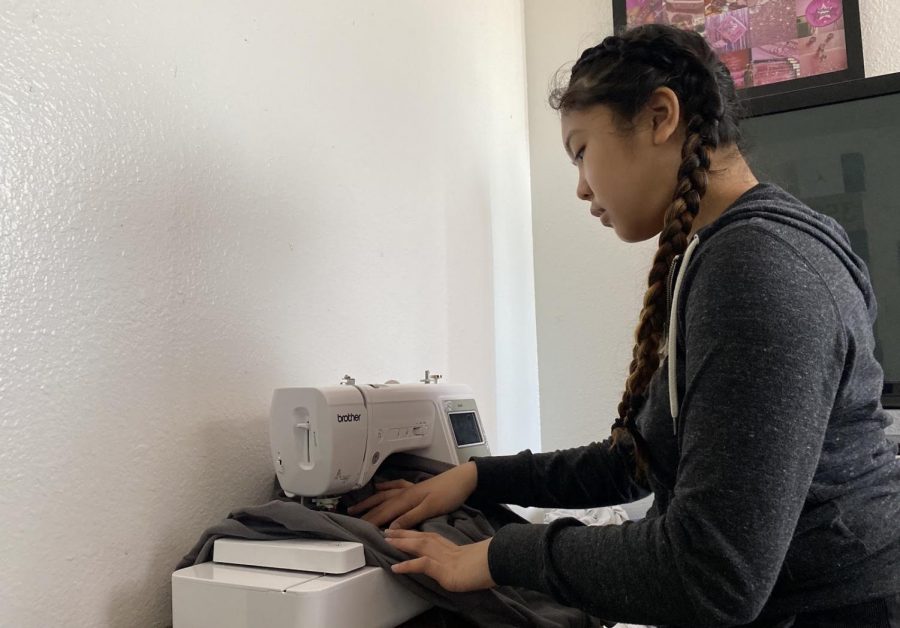Entrepreneurs start businesses
Online retail becomes path of income for students
Sophomore Isabella Alarcon, who runs a business reselling her customized clothing, alters a sweatshirt. A 2018 study of 1,000 teens showed that 41% would consider entrepreneurship as a career option versus working in a traditional job, according to Junior Achievement.
March 25, 2021
Senior Giselle Moulia spends her free time sorting through her closet and purchasing thrifted clothing to resell to customers all across the City.
Although many teenagers face overstuffed closets, small budgets and outgrown clothes, some have found solutions to this problem by starting small businesses. The most common small business ideas for teens are selling items on the Etsy website, social media influencing, and tutoring, according to the U.S. Chamber of Commerce.
“I used to sell clothing through Depop,” Moulia said. “They do take 10% of sales, which adds up, so I made an Instagram account to post images of the items and deliver it to buyers within San Francisco.”
Instead of selling clothing items that they wear frequently, some teens are purchasing second-hand clothing and reselling items online. Sophomore Isabella Alarcon Says that that extra time spent at home due to the COVID-19 pandemic has also contributed to their interest in retail.
“When my grandma passed away, she left me her sewing machine, which I learned to use this summer when we were all stuck indoors,” Alarcon said. “I started to sew some of my own clothes as well as some I have purchased and have recently been selling them on Depop where I’ve made 61 sales so far.”
With over 21 million users on Depop, it can be difficult to maintain a unique feed and gain a following on the platform.
“I have tried to spread the word about my business by shouting out my account to friends and family and having previous customers do the same,” senior Audrey Scott, who sells handmade jewelry on her Instagram, said. “To be truly successful on Depop, you have to really understand your audience and their needs.”
A small business should center around one’s strengths, regardless of their resources, according to Amelia Linde, Deputy Director of Small Business Initiatives at the San Francisco Chamber of Commerce.
“Think about what it is that you enjoy doing and what comes naturally to you,” Linde said. “Learn all you can about that and then make a plan. Think about who you are going to sell your product or service to, how are you going to deliver it to them and what you are going to charge.”
Determining price points can be a roadblock for many young entrepreneurs. Marking up the cost a few dollars from the original price can be a simple answer, however it is important to consider that many of these items are second-hand, according to senior Madison Lerseth.
“Because the clothes I sell are used items, I value them at a more affordable price,” Lerseth said. “I am also promoting sustainability, which is also important to think about when buying clothes.”
For those manufacturing their own products, however, it can be more challenging to derive a solid price point.
“After creating quite the collection of jewelry, I began getting compliments from friends and decided that I could make some money out of it,” Scott said. “I determine the price by looking at similar items on Depop and Etsy.”
Some students also find that because they are now earning their own money, they are more prudent about spending it. Utilizing parents’ funds can metaphorically decrease the value of money.
“When you make your own money, it causes you to be more hesitant towards throwing it away at things,” Alarcon said. “I am definitely appreciative to have my parents’ financial support, but earning my own revenue has helped me be more aware of how I have been spending.”
Starting a small business can not only increase financial support and literacy, but can also provide important life experiences and develop people skills.
“I am definitely improving my communication skills,” Moulia said. “I have to simultaneously negotiate with buyers and make sure they’re happy while also making sure I’m going to gain from the sale.”










